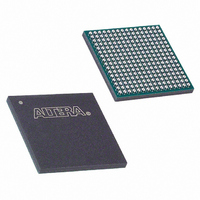EPM570F256I5N Altera, EPM570F256I5N Datasheet - Page 19

EPM570F256I5N
Manufacturer Part Number
EPM570F256I5N
Description
IC MAX II CPLD 570 LE 256-FBGA
Manufacturer
Altera
Series
MAX® IIr
Specifications of EPM570F256I5N
Programmable Type
In System Programmable
Delay Time Tpd(1) Max
5.4ns
Voltage Supply - Internal
2.5V, 3.3V
Number Of Logic Elements/blocks
570
Number Of Macrocells
440
Number Of I /o
160
Operating Temperature
-40°C ~ 100°C
Mounting Type
Surface Mount
Package / Case
256-FBGA
Voltage
2.5V, 3.3V
Memory Type
FLASH
Number Of Logic Elements/cells
570
Family Name
MAX II
# Macrocells
440
Frequency (max)
1.8797GHz
Propagation Delay Time
8.7ns
Number Of Logic Blocks/elements
57
# I/os (max)
160
Operating Supply Voltage (typ)
2.5/3.3V
In System Programmable
Yes
Operating Supply Voltage (min)
2.375V
Operating Supply Voltage (max)
3.6V
Operating Temp Range
-40C to 100C
Operating Temperature Classification
Industrial
Mounting
Surface Mount
Pin Count
256
Package Type
FBGA
No. Of I/o's
160
Propagation Delay
8.7ns
Global Clock Setup Time
1.9ns
Frequency
201.1MHz
Supply Voltage Range
2.375V To 2.625V, 3V To 3.6V
Operating Temperature Range
-40°C To +100°C
Rohs Compliant
Yes
Lead Free Status / RoHS Status
Lead free / RoHS Compliant
Features
-
Lead Free Status / Rohs Status
Compliant
Other names
544-1399
EPM570F256I5N
EPM570F256I5N
Available stocks
Company
Part Number
Manufacturer
Quantity
Price
Company:
Part Number:
EPM570F256I5N
Manufacturer:
ALTERA
Quantity:
26
Part Number:
EPM570F256I5N
Manufacturer:
ALTERA/阿尔特拉
Quantity:
20 000
Chapter 2: MAX II Architecture
Logic Elements
Figure 2–9. Carry-Select Chain
© October 2008 Altera Corporation
LAB Carry-In
A1
B1
A2
B2
A3
B3
A4
B4
A6
B6
A7
B7
A8
B8
A9
B9
A10
B10
A5
B5
The speed advantage of the carry-select chain is in the parallel precomputation of
carry chains. Since the LAB carry-in selects the precomputed carry chain, not every LE
is in the critical path. Only the propagation delays between LAB carry-in generation
(LE 5 and LE 10) are now part of the critical path. This feature allows the MAX II
architecture to implement high-speed counters, adders, multipliers, parity functions,
and comparators of arbitrary width.
Figure 2–9
portion of the LUT generates the sum of two bits using the input signals and the
appropriate carry-in bit; the sum is routed to the output of the LE. The register can be
bypassed for simple adders or used for accumulator functions. Another portion of the
LUT generates carry-out bits. An LAB-wide carry-in bit selects which chain is used for
the addition of given inputs. The carry-in signal for each chain, carry-in0 or
carry-in1, selects the carry-out to carry forward to the carry-in signal of the next-
higher-order bit. The final carry-out signal is routed to an LE, where it is fed to local,
row, or column interconnects.
LAB Carry-Out
0
0
LE0
LE1
LE2
LE3
LE4
LE5
LE6
LE7
LE8
LE9
1
1
Sum1
Sum2
Sum3
Sum4
Sum5
Sum6
Sum7
Sum8
Sum9
Sum10
shows the carry-select circuitry in an LAB for a 10-bit full adder. One
To top of adjacent LAB
LAB Carry-In
Carry-In0
Carry-In1
data1
data2
Carry-Out0
LUT
LUT
LUT
LUT
Carry-Out1
Sum
MAX II Device Handbook
2–11














